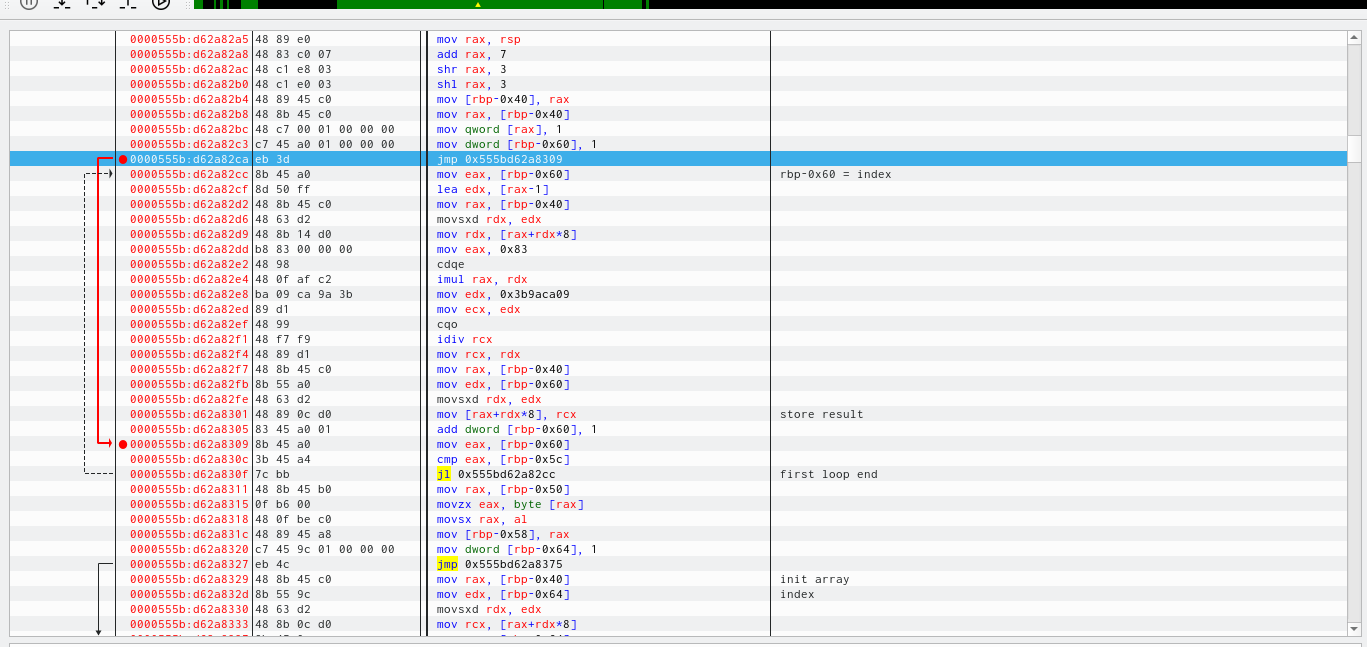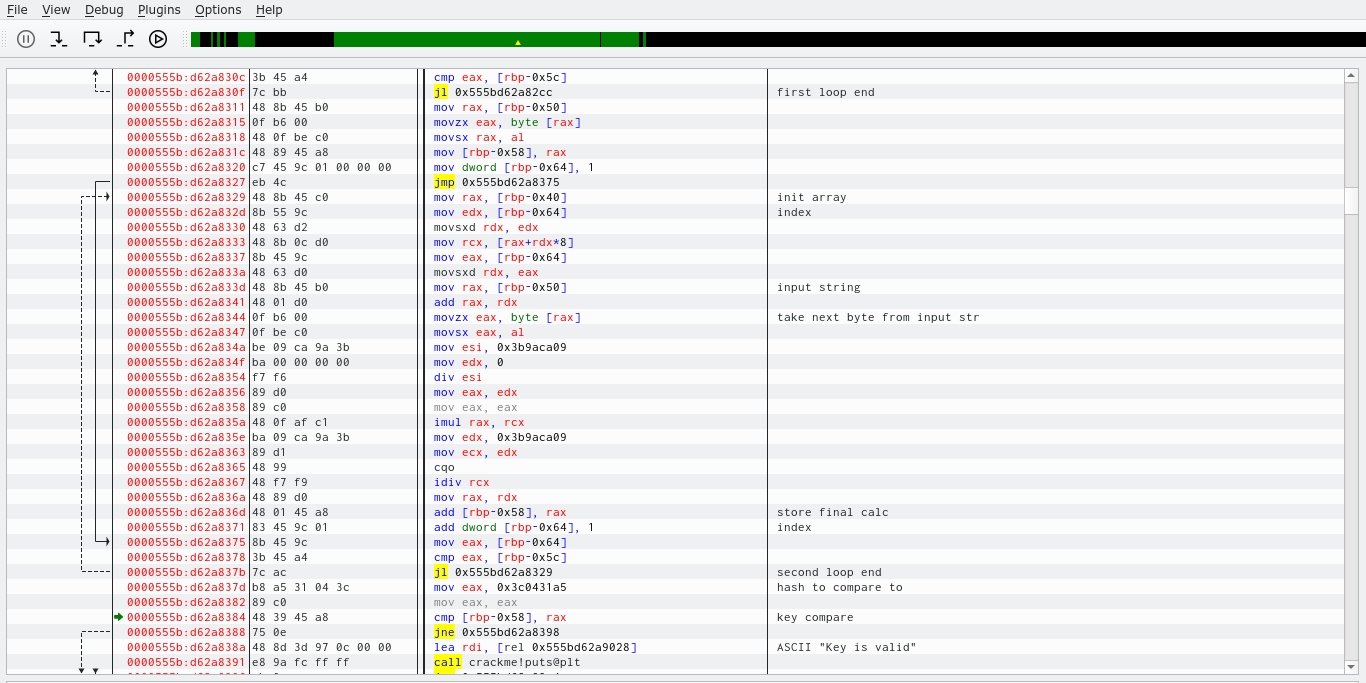Hash checker 0x01
Name: Hash checker 0x01
Author: f0rizen
URL: https://crackmes.one/crackme/622db5be33c5d46c8bcc027f
Download: here
Difficulty: 1
Quality: 2
Goal: write a key generator
Method: static analysis
Tools used: Ghidra
Executable format: ELF
Arch: x86-64
MD5: c211da76a03bf54bbc953ae5b1bbc457
SHA256: d69c34d6d961df2d8fcc6f2db74d566756efaad92ac9fac366422746ac5490d5
Tutorial
Run the crackme with ./crackme and enter random input

Ghidra
Import the crackme in Ghidra, and run it with standard analysis.
Open the Ghidra decompiler with CTRL+E and rename the variables accordingly.
After some time of analysis, I chose the following names for variables.
undefined8 main(int argc,long argv)
{
int isNum;
size_t l;
undefined8 uVar1;
ulong halfLen;
long in_FS_OFFSET;
long params [2];
int numParameter;
int j;
int i;
int len;
long hash;
char *input;
long unusedLen;
long *initArr;
long local_40;
local_40 = *(long *)(in_FS_OFFSET + 0x28);
params[1] = argv;
numParameter = argc;
if (argc == 2) {
params[0] = 0x1011fb;
l = strlen(*(char **)(argv + 8));
if ((int)l == 6) {
params[0] = 0x101213;
isNum = checker(*(undefined8 *)(params[1] + 8));
if (isNum != 0) {
params[0] = 0x101240;
l = strlen(*(char **)(params[1] + 8));
len = (int)l;
input = *(char **)(params[1] + 8);
unusedLen = (long)len + -1;
halfLen = ((long)len * 8 + 0xfU) / 0x10;
initArr = params + halfLen * -2 + 1;
*initArr = 1;
for (i = 1; i < len; i = i + 1) {
initArr[i] = (initArr[i + -1] * 0x83) % 0x3b9aca09;
}
/* first char value from input */
hash = (long)*input;
for (j = 1; j < len; j = j + 1) {
hash = hash + (long)(((ulong)(uint)(int)input[j] % 0x3b9aca09) * initArr[j]) % 0x3b9aca09;
}
if (hash == 0x3c0431a5) {
params[halfLen * -2] = 0x101396;
puts("Key is valid");
}
else {
params[halfLen * -2] = 0x1013a4;
puts("Wrong key!");
}
uVar1 = 0;
goto LAB_001013a9;
}
}
}
params[0] = 0x101223;
puts("Usage: ./crackme XXXXXX");
uVar1 = 1;
LAB_001013a9:
if (local_40 != *(long *)(in_FS_OFFSET + 0x28)) {
/* WARNING: Subroutine does not return */
params[0] = 0x1013c0;
__stack_chk_fail();
}
return uVar1;
}
Some of import points in this decompiled main function:
- key must be equal to 6 symbols
- key can contain only digits - check performed by
IsNumfunction - first loop initializes a 6 element quadword array (64 bit) with magic values - constant values - first element value is 0x1
- second loop performs mul/mod calculation between elements of
init(magic array) andinputarray - first element value isinput[0]. Result of calculation is added tohashvariable. - final
hashvalue is compared to magic value0x3c0431a5and if it’s true prints goodboy message
Bruteforcing it with sh
Since a key is limited to 6 digit number, it’s not a problem to bruteforce with a simple bourne shell script. It took a couple of minutes to find a key.
Loop starts from 100000 as the minimal 6 digit number, and tries all the numbers up to 1000000 grepping for goodboy message.
You can download the script here.
#!/bin/sh
i=100000
max=1000000
while [ $i -lt $max ]
do
./crackme $i | grep "Key is valid" && echo "key: " $i
i=`expr $i + 1`
done
There is only valid key for this challenge:

Implementing Hash checker 0x1 in Go
Ghidra decompilation is of great help, so putting it together in Go was straightforward. You can download the code here
package main
import (
"fmt"
"os"
"strconv"
)
func isNum(input string) bool {
_, err := strconv.Atoi(input)
return err == nil
}
func main() {
if len(os.Args) != 2 || len(os.Args[1]) != 6 || !isNum(os.Args[1]) {
fmt.Println("Usage: ", os.Args[0], "xxxx")
return
}
input := os.Args[1]
//input := "231337"
n := len(input)
init := [6]uint64{1, 0, 0, 0, 0, 0}
// initialize the rest of the magic values, these are always the same for init array
// init := [6]uint64{0x1, 0x83, 0x4309, 0x224d9b, 0x118db651, 0x228a4e1d}
for i := 1; i < n; i++ {
init[i] = (init[i-1] * 0x83) % 0x3b9aca09
}
//fmt.Printf("init array: %x\n", init)
hash := uint64(input[0])
for j := 1; j < n; j++ {
// hash = hash + (uint64(input[j])%0x3b9aca09)*init[j]%0x3b9aca09 // ghidra decompiler
// remove unecessary mod and parentheses - simplify
hash = hash + uint64(input[j])*init[j]%0x3b9aca09
}
//fmt.Printf("hash: %x\n", hash)
if hash == 0x3c0431a5 {
fmt.Println("Key is valid!")
} else {
fmt.Println("Wrong key!")
}
}
Dynamic analysis
It’s been long time since I coded in assembly, or I worked in debugger with stripped binary.
Initially I went with gdb, radare2 -D, but ended up using edb debugger since it’s the closest experience to OllyDbg on Windows, which I greatly admired and still have developed muscle memory for it.
Unfortunately, at the moment of writing it is possible not export comments, so I will dump screenshots in hope you will find it useful.
First loop - initialization array

Second loop - hash calculation - and check
